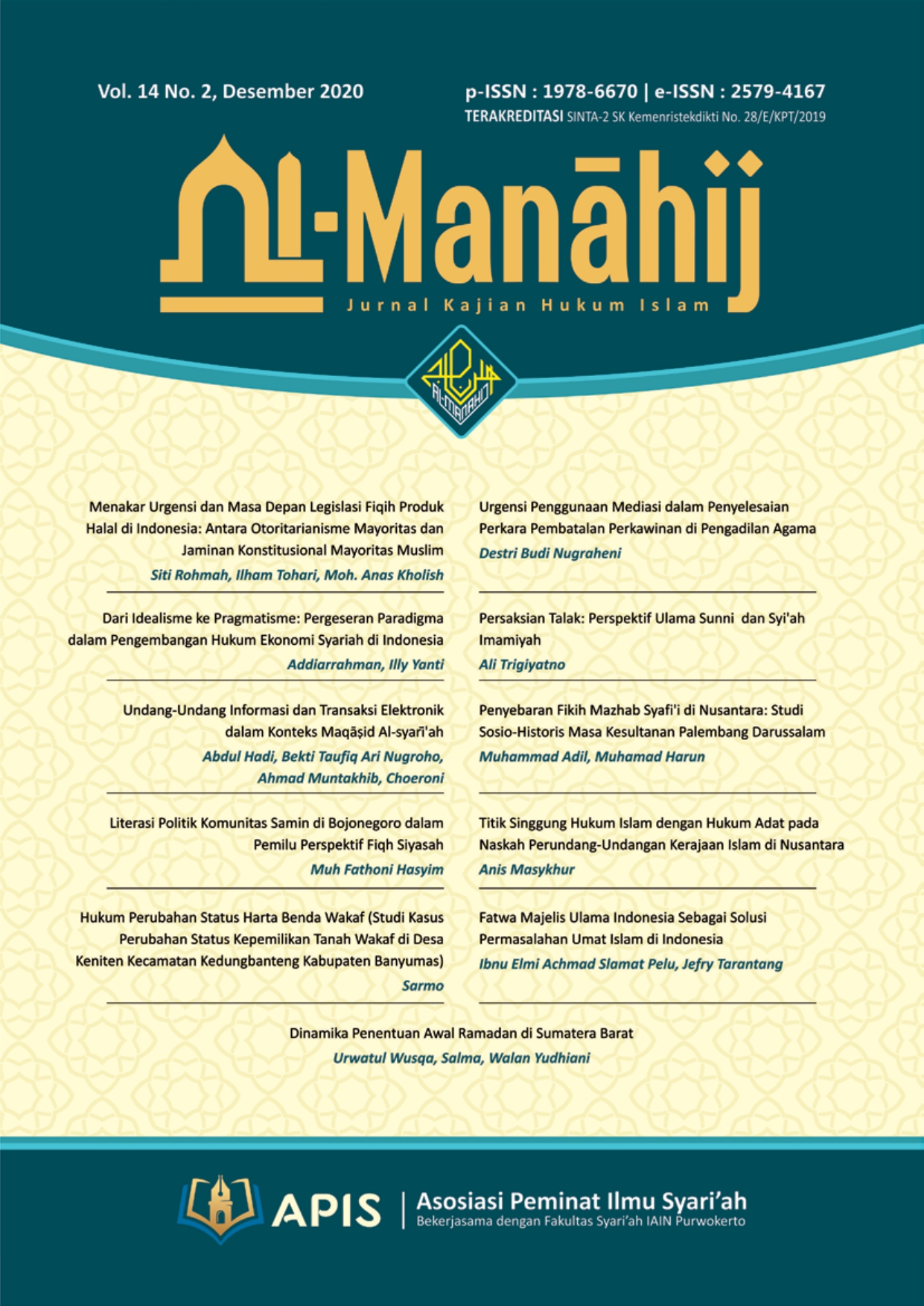Dari Idealisme ke Pragmatisme: Pergeseran Paradigma dalam Pengembangan Hukum Ekonomi Syariah di Indonesia
DOI:
https://doi.org/10.24090/mnh.v14i2.3408Keywords:
idealism, pragmatism, paradigm shift, sharia economic law, Islamic law in IndonesiaAbstract
This study seeks to understand the pragmatism of the development of sharia economic law, and its implications for Islamic financial products in Indonesia. The data comes from the results of interviews and focus group discussions with key informants from academics, practitioners, authorities, and the public. This research finds that pragmatism in the development of Islamic economic law is an approach that still dominates the DSN-MUI fatwas. The pragmatism style used is complex-eclectic pragmatism which is represented through makhÄrij al-fiqhiyyah, which is to choose a mild opinion by sticking to the strongest method or also called "taysÄ«r al-manhajÄ«". The use of this method is intended to ensure that the fatwa is truly able to answer the needs of the business world, as well as being in line with sharia principles. DSN-MUI also does not use maslahah as a legal consideration in a free or liberal way. Rather, it returns maslahah in consideration of the method, so that it is permissible to use the bay’ al-'inÄn contract only in a forced state (á¸arurah).Downloads
Download data is not yet available.
References
Addiarrahman. “Pos-Islamisme ‘Ilmu’ Ekonomi Islam Di Era Urban Dan Multikulturalisme.†Islam Realitas: Journal of Islamic & Social Studies 1, no. 2, Desember 2015.
Adinda, Anastasia Jessica. “Epistemologi Pragmatisme.†Arete 7, no. 1, 2018.
Ahmed, Habib. “Maqasid al-Shari’ah and Islamic Financial Products: a Framework for Assessment.†ISRA International Journal of Islamic Finance 3, no. 1, 2011.
Aly Abdel Moniem. “Islamic Education Philosophy for Sustainable Development: Quranic-Based Maqasid Perspective with Special Attention to Indonesia.†Indonesian Journal of Islamic Economic and Business 2, no. 2, 2017.
Amin, Ma’ruf. “Solusi Hukum Islam (Makharij Fiqhiyyah) Sebagai Pendorong Arus Baru Ekonomi Syariah Di Indonesia.†Orasi Ilmiah Disampaikan Dalam Pengukuhan Guru Besar Bidang Ilmu Ekonomi Muamalat Syariah. Malang, 2017.
Amir Syarifuddin. Ushul Fiqh Jilid 2. Jakarta: Logos, 2001.
Asmuni Mth. “Produk Perbankan Syariah; Antara al-Minhaj al-Raddi dan al-Minhaj al-Maqashidi.†al-Islamiyah XIX, no. 1, 2013.
Asrorun Ni’am Sholeh. Metodologi Penetapan Fatwa Majelis Ulama Indonesia. Jakarta: Emir Cakrawala Islam, 2016.
Auda, Jasser. Maqasid al-Shariah as Philosophy of Islamic Law: A Systems Approach. Malaysia: IIIT, 2008.
Ayer (auth.), A. J. The Origins of Pragmatism: Studies in the Philosophy of Charles Sanders Peirce and William James. Palgrave Macmillan UK, 1968. http://gen.lib.rus.ec/book/index.php?md5=35dd64f2f1c5a5013f1d7cab7eeee1be.
Bagus, Lorens. Kamus filsafat. Ed. 1. Jakarta: Gramedia Pustaka Utama, 1996.
Chong, Beng Soon, dan Ming-Hua Liu. “Islamic banking: Interest-free or interest-based?†Pacific-Basin Finance Journal 17, no. 1, Januari 2009. https://doi.org/10.1016/j.pacfin.2007.12.003.
Cooter, Robert B., dan Thomas Ulen. Law and Economics, 6th Edition. 6th Edition. Pearson Series in Economics. Prentice Hall, 2011. http://gen.lib.rus.ec/book/index.php?md5=4BC55DA23884B7603280FECC527F4743.
Grassa, Rihab, dan Kaouthar Gazdar. “Law and Islamic Finance: How Legal Origins Affect Islamic Finance Development?†Borsa Istanbul Review 14, no. 3, September 2014. https://doi.org/10.1016/j.bir.2014.05.001.
Harjana, Mangun. “Isme-isme dalam Etika dari A Sampai Z.†Yogyakarta: Kanisius, 1996.
Harun Hadiwijono. Sari Sejarah Filsafat Barat 2. Yogyakarta: Kanisius, 1980.
Hidayati, Noor Azmah. “Politik Akomodasionis Orde Baru Terhadap (Umat) Islam: Telaah Historis Kelahiran Perbankan Syariah.†Millah Jurnal Studi Islam 4, no. 2, Januari 2005. http://journal.uii.ac.id/index.php/Millah/article/view/5835/5263.
Ibrahim, Ahmed Fekry. Pragmatism in Islamic Law: A Social and Intellectual History. Middle East studies beyond dominant paradigms. Syracuse, New York: Syracuse University Press, 2015.
Imam, Patrick, dan Kangni Kpodar. “Islamic banking: Good for growth?†Economic Modelling 59, Desember 2016). https://doi.org/10.1016/j.econmod.2016.08.004.
Kamali, Mohammad Hashim. “Maqasid al-shari’ah and ijtihad as instruments of civilisational renewal: a methodological perspective.†Islam and Civilisational Renewal 2, no. 2, 2011.
Kamali, Mohammad Hashim. “Maqasid al-Shariah: The Objectives of Islamic Law.†Islamic studies 38, no. 2, 1999.
Khan, Feisal. “How ‘Islamic’ is Islamic Banking?†Journal of Economic Behavior & Organization 76, no. 3, Desember 2010. https://doi.org/10.1016/j.jebo.2010.09.015.
Laldin, Mohamad Akram, dan Hafas Furqani. “Innovation versus Replication: Some Notes on the Approaches in Defining Shariah Compliance in Islamic Finance.†Al-Jami’ah: Journal of Islamic Studies 54, no. 2, Desember 2016. https://doi.org/10.14421/ajis.2016.542.249-272.
Luth, Thohir, Masruchin Ruba’i, Jazim Hamidi, dan Burhanuddin Susmto. “The Role of Sharia Economic Law in Sustainable Development in Indonesia.†Journal of Law, Policy and Globalization 63, no. 1, 2017.
Majma’ Al-Lughoh Al-‘arabiyah Mesir. Mu’jam al-Wasith Jilid 2. Mesir: Maktabah Shurouq ad-Dauliyyah, 2011.
Muadz, M. Husni. Anatomi Sistem Sosial Rekonstruksi Normalitas Relasi Intersubyektivitas dengan Pendekatan Sistem. Mataram: Institute Pembelajaran Gelar Hidup (IPGH), 2013.
Muhammad Roy Purwanto. Dekonstruksi Teori Hukum Islam: Kritik terhadap Konsep Maslahah Najmuddin al-Thufi. Yogyakarta: Kaukaba, 2014.
Muji Kartika Rahayu. Sengketa Mazhab Hukum. Jakarta: Kompas, 2018.
Nasution, Khoiruddin. “Metode Pembaruan Hukum Keluarga Islam Kontemporer.†UNISIA 30, no. 66, 2007. https://doi.org/10.20885/unisia.vol30.iss66.art1.
Pratiwi, Ari. “Islamic banking contribution in sustainable socioeconomic development in Indonesia: An epistemological approach.†Humanomics 32, no. 2, Mei 2016. https://doi.org/10.1108/H-12-2015-0085.
Saeed, Abdullah. “Indonesian Islamic Banking in Historical and Legal Context.†Dalam Indonesia: Law and Society, edited by Tim Lindsey. Sydney: Federation Press, 1999.
Saeed, Abdullah. “Islamic Banking Moving Towards a Pragmatic Approach?†ISIM Newsletter 3, 1999.
Saeed, Abdullah, dan O. Salah. “Development of sukuk: pragmatic and idealist approaches to sukuk structures.†Journal of International Banking Law and Regulation 29, no. 1, 2014.
Syarif, Ahmad. “The Growth of Islamic Banking and SMEs Financing in Indonesia.†Human Falah 3, no. 1, 2016.
Syarifuddin, Amir. Ushul Fiqh Jilid I. Jakarta: Logos, 1997.
Tamanaha, Brian Z. A Realistic Theory of Law. Cambridge University Press, 2017. http://gen.lib.rus.ec/book/index.php?md5=4ed9ace9d76c86df303c92c67268a48b.
Totok Jumantoro, dan Samsul Munir Amin. Kamus Ilmu Ushul Fikih. Jakarta: Amzah, 2005.
Pikiran Rakyat. “Tumbuh Tinggi, Pangsa Pasar Perbankan Syariah Tembus 5,74%,†16 April 2018. http://www.pikiran-rakyat.com/ekonomi/2018/04/16/tumbuh-tinggi-pangsa-pasar-perbankan-syariah-tembus-574-422874.
Yanti, Illy. “Quo vadis Peradilan Agama dalam Pengembangan Hukum Ekonomi Syariah di Indonesia.†Al-Risalah 16, no. 2, Mei 2017.
Yasin, Mohamad Nur. “Pragmatisme Perbankan Syariah Dalam Penyelesaian Eksekusi Objek Hak Tanggungan: Studi Putusan Nomor 116/Pdt.Plw/2015/PN.Kpn.†Al-Ihkam: Jurnal Hukum Dan Pranata Sosial 12, no. 1, Agustus 2017. https://doi.org/10.19105/al-ihkam.v12i1.1144.
Yasin, Muhammad Nur. “Argumen-Argumen Kemunculan Awal Perbankan Syariah di Indonesia.†De Jure: Jurnal Syariah dan Hukum 2, no. 1, Juni 2010.
Adinda, Anastasia Jessica. “Epistemologi Pragmatisme.†Arete 7, no. 1, 2018.
Ahmed, Habib. “Maqasid al-Shari’ah and Islamic Financial Products: a Framework for Assessment.†ISRA International Journal of Islamic Finance 3, no. 1, 2011.
Aly Abdel Moniem. “Islamic Education Philosophy for Sustainable Development: Quranic-Based Maqasid Perspective with Special Attention to Indonesia.†Indonesian Journal of Islamic Economic and Business 2, no. 2, 2017.
Amin, Ma’ruf. “Solusi Hukum Islam (Makharij Fiqhiyyah) Sebagai Pendorong Arus Baru Ekonomi Syariah Di Indonesia.†Orasi Ilmiah Disampaikan Dalam Pengukuhan Guru Besar Bidang Ilmu Ekonomi Muamalat Syariah. Malang, 2017.
Amir Syarifuddin. Ushul Fiqh Jilid 2. Jakarta: Logos, 2001.
Asmuni Mth. “Produk Perbankan Syariah; Antara al-Minhaj al-Raddi dan al-Minhaj al-Maqashidi.†al-Islamiyah XIX, no. 1, 2013.
Asrorun Ni’am Sholeh. Metodologi Penetapan Fatwa Majelis Ulama Indonesia. Jakarta: Emir Cakrawala Islam, 2016.
Auda, Jasser. Maqasid al-Shariah as Philosophy of Islamic Law: A Systems Approach. Malaysia: IIIT, 2008.
Ayer (auth.), A. J. The Origins of Pragmatism: Studies in the Philosophy of Charles Sanders Peirce and William James. Palgrave Macmillan UK, 1968. http://gen.lib.rus.ec/book/index.php?md5=35dd64f2f1c5a5013f1d7cab7eeee1be.
Bagus, Lorens. Kamus filsafat. Ed. 1. Jakarta: Gramedia Pustaka Utama, 1996.
Chong, Beng Soon, dan Ming-Hua Liu. “Islamic banking: Interest-free or interest-based?†Pacific-Basin Finance Journal 17, no. 1, Januari 2009. https://doi.org/10.1016/j.pacfin.2007.12.003.
Cooter, Robert B., dan Thomas Ulen. Law and Economics, 6th Edition. 6th Edition. Pearson Series in Economics. Prentice Hall, 2011. http://gen.lib.rus.ec/book/index.php?md5=4BC55DA23884B7603280FECC527F4743.
Grassa, Rihab, dan Kaouthar Gazdar. “Law and Islamic Finance: How Legal Origins Affect Islamic Finance Development?†Borsa Istanbul Review 14, no. 3, September 2014. https://doi.org/10.1016/j.bir.2014.05.001.
Harjana, Mangun. “Isme-isme dalam Etika dari A Sampai Z.†Yogyakarta: Kanisius, 1996.
Harun Hadiwijono. Sari Sejarah Filsafat Barat 2. Yogyakarta: Kanisius, 1980.
Hidayati, Noor Azmah. “Politik Akomodasionis Orde Baru Terhadap (Umat) Islam: Telaah Historis Kelahiran Perbankan Syariah.†Millah Jurnal Studi Islam 4, no. 2, Januari 2005. http://journal.uii.ac.id/index.php/Millah/article/view/5835/5263.
Ibrahim, Ahmed Fekry. Pragmatism in Islamic Law: A Social and Intellectual History. Middle East studies beyond dominant paradigms. Syracuse, New York: Syracuse University Press, 2015.
Imam, Patrick, dan Kangni Kpodar. “Islamic banking: Good for growth?†Economic Modelling 59, Desember 2016). https://doi.org/10.1016/j.econmod.2016.08.004.
Kamali, Mohammad Hashim. “Maqasid al-shari’ah and ijtihad as instruments of civilisational renewal: a methodological perspective.†Islam and Civilisational Renewal 2, no. 2, 2011.
Kamali, Mohammad Hashim. “Maqasid al-Shariah: The Objectives of Islamic Law.†Islamic studies 38, no. 2, 1999.
Khan, Feisal. “How ‘Islamic’ is Islamic Banking?†Journal of Economic Behavior & Organization 76, no. 3, Desember 2010. https://doi.org/10.1016/j.jebo.2010.09.015.
Laldin, Mohamad Akram, dan Hafas Furqani. “Innovation versus Replication: Some Notes on the Approaches in Defining Shariah Compliance in Islamic Finance.†Al-Jami’ah: Journal of Islamic Studies 54, no. 2, Desember 2016. https://doi.org/10.14421/ajis.2016.542.249-272.
Luth, Thohir, Masruchin Ruba’i, Jazim Hamidi, dan Burhanuddin Susmto. “The Role of Sharia Economic Law in Sustainable Development in Indonesia.†Journal of Law, Policy and Globalization 63, no. 1, 2017.
Majma’ Al-Lughoh Al-‘arabiyah Mesir. Mu’jam al-Wasith Jilid 2. Mesir: Maktabah Shurouq ad-Dauliyyah, 2011.
Muadz, M. Husni. Anatomi Sistem Sosial Rekonstruksi Normalitas Relasi Intersubyektivitas dengan Pendekatan Sistem. Mataram: Institute Pembelajaran Gelar Hidup (IPGH), 2013.
Muhammad Roy Purwanto. Dekonstruksi Teori Hukum Islam: Kritik terhadap Konsep Maslahah Najmuddin al-Thufi. Yogyakarta: Kaukaba, 2014.
Muji Kartika Rahayu. Sengketa Mazhab Hukum. Jakarta: Kompas, 2018.
Nasution, Khoiruddin. “Metode Pembaruan Hukum Keluarga Islam Kontemporer.†UNISIA 30, no. 66, 2007. https://doi.org/10.20885/unisia.vol30.iss66.art1.
Pratiwi, Ari. “Islamic banking contribution in sustainable socioeconomic development in Indonesia: An epistemological approach.†Humanomics 32, no. 2, Mei 2016. https://doi.org/10.1108/H-12-2015-0085.
Saeed, Abdullah. “Indonesian Islamic Banking in Historical and Legal Context.†Dalam Indonesia: Law and Society, edited by Tim Lindsey. Sydney: Federation Press, 1999.
Saeed, Abdullah. “Islamic Banking Moving Towards a Pragmatic Approach?†ISIM Newsletter 3, 1999.
Saeed, Abdullah, dan O. Salah. “Development of sukuk: pragmatic and idealist approaches to sukuk structures.†Journal of International Banking Law and Regulation 29, no. 1, 2014.
Syarif, Ahmad. “The Growth of Islamic Banking and SMEs Financing in Indonesia.†Human Falah 3, no. 1, 2016.
Syarifuddin, Amir. Ushul Fiqh Jilid I. Jakarta: Logos, 1997.
Tamanaha, Brian Z. A Realistic Theory of Law. Cambridge University Press, 2017. http://gen.lib.rus.ec/book/index.php?md5=4ed9ace9d76c86df303c92c67268a48b.
Totok Jumantoro, dan Samsul Munir Amin. Kamus Ilmu Ushul Fikih. Jakarta: Amzah, 2005.
Pikiran Rakyat. “Tumbuh Tinggi, Pangsa Pasar Perbankan Syariah Tembus 5,74%,†16 April 2018. http://www.pikiran-rakyat.com/ekonomi/2018/04/16/tumbuh-tinggi-pangsa-pasar-perbankan-syariah-tembus-574-422874.
Yanti, Illy. “Quo vadis Peradilan Agama dalam Pengembangan Hukum Ekonomi Syariah di Indonesia.†Al-Risalah 16, no. 2, Mei 2017.
Yasin, Mohamad Nur. “Pragmatisme Perbankan Syariah Dalam Penyelesaian Eksekusi Objek Hak Tanggungan: Studi Putusan Nomor 116/Pdt.Plw/2015/PN.Kpn.†Al-Ihkam: Jurnal Hukum Dan Pranata Sosial 12, no. 1, Agustus 2017. https://doi.org/10.19105/al-ihkam.v12i1.1144.
Yasin, Muhammad Nur. “Argumen-Argumen Kemunculan Awal Perbankan Syariah di Indonesia.†De Jure: Jurnal Syariah dan Hukum 2, no. 1, Juni 2010.
Downloads
Published
03-12-2020
How to Cite
Addiarrahman, A., & Yanti, I. (2020). Dari Idealisme ke Pragmatisme: Pergeseran Paradigma dalam Pengembangan Hukum Ekonomi Syariah di Indonesia. Al-Manahij: Jurnal Kajian Hukum Islam, 14(2), 191–210. https://doi.org/10.24090/mnh.v14i2.3408
Issue
Section
ARTICLES
License
Authors who publish with this journal agree to the following terms:
- Authors retain copyright and grant the journal right of first publication with the work simultaneously licensed under a Creative Commons Attribution License that allows others to share the work with an acknowledgement of the work's authorship and initial publication in this journal.
- Authors are able to enter into separate, additional contractual arrangements for the non-exclusive distribution of the journal's published version of the work (e.g., post it to an institutional repository or publish it in a book), with an acknowledgement of its initial publication in this journal.
- Authors are permitted and encouraged to post their work online (e.g., in institutional repositories or on their website) prior to and during the submission process, as it can lead to productive exchanges, as well as earlier and greater citation of published work (See The Effect of Open Access).


















